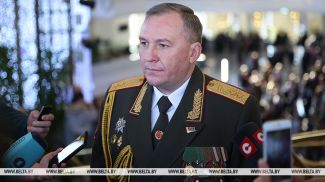MINSK, 24 May (BelTA) – The government of Belarus supports the WHO's efforts to provide assistance to the civilian population of Ukraine, Belarus' Healthcare Minister Dmitry Pinevich said at the plenary session of the Seventy-fifth World Health Assembly, BelTA learned from the press service of the Healthcare Ministry.
The minister noted that the government of Belarus supports the WHO's efforts to help Ukraine's civilians who found themselves in a difficult humanitarian situation in the country and abroad, the press service noted.
According to Dmitry Pinevich, Belarus supports WHO's Global Health for Peace Initiative (GHPI), as well as the organization's long-term commitment to respond to disease outbreaks in conflict zones.
According to the minister, health action can make a real difference as health is often viewed as a common good by everyone, which serves as a starting point for building bridges between people. “The Health for Peace Initiative strengthens the sustainability of our efforts and impact thanks to dialogue, involvement, inclusiveness and trust building,” he said.
“In the face of increasing pressure on healthcare systems, including that of our country, we believe it is of critical importance to maintain access to healthcare and medicines for those in need. In this regard, I urge my colleagues to use every opportunity, including their political weight and administrative resources, to do everything to keep the supply channels of medicines and medical equipment open, to continue international technical assistance,” Dmitry Pinevich said.
The minister also spoke about Belarus' response to the COVID-19 pandemic. According to him, the success of Belarus' coronavirus response strategy rests in many ways on the effective work of public administration bodies and the healthcare system, as well as an extensive hospital bed capacity. Even the smallest district of the country has an infectious diseases department or a small infectious diseases hospital. The network of epidemiological protection is up and running.
During the pandemic, the country purchased all the necessary medical supplies; manufacturers were mobilized to produce oxygen when it was insufficient. At the same time, routine health service delivery was not interrupted. More than $2 billion from the government reserves has already been spent on the healthcare sector alone to overcome the pandemic and its consequences.
“This, among other things, enabled us to avoid a lockdown. We have learned to live with the pandemic without taking emergency steps. From the very first days, we were able to adapt to a new environment and find innovative solutions to this problem in the shortest possible time without hysterics and fuss. Belarus continues to pay priority attention to this issue. An active vaccination campaign is going on in the country. A domestic vaccine is under development. In the future it can be exported to other countries through WHO mechanisms,” Dmitry Pinevich said.
Dmitry Pinevich is leading the official delegation of the Republic of Belarus at the Seventy-fifth World Health Assembly in Geneva. It is the first in-person Health Assembly since the start of the COVID-19 pandemic. Strengthening preparedness for and response to health emergencies are a key theme of the Health Assembly. Representatives of 194 WHO Member States are taking part in the WHO forum.
In addition to discussing preparedness and response to public health emergencies, the delegates are discussing the Draft implementation road map 2023–2030 for the global action plan for the prevention and control of non-communicable diseases 2013–2030, Draft intersectoral global action plan on epilepsy and other neurological disorders 2022–2031, tuberculosis and poliomyelitis eradication, sustainable financing, etc.
The appointment of the next Director-General of the World Health Organization will take place, following the nomination by the 150th session of the Executive Board in January 2022 of Dr Tedros Adhanom Ghebreyesus, who is the incumbent Director-General.













